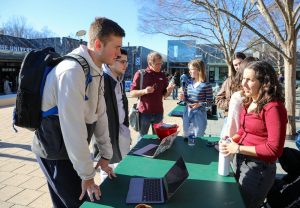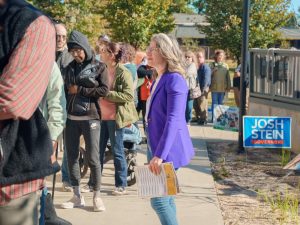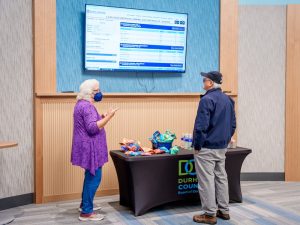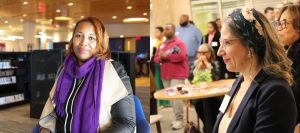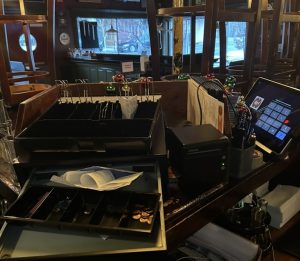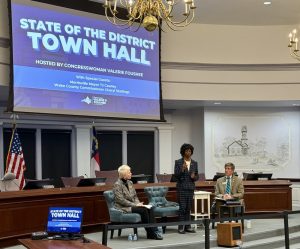Until her senior year at North Carolina State University, Nida Allam was envisioning a future in STEM. As a member of the first class to graduate from N.C. State University with a degree in sustainable materials and technology, Allam was trained to look at everyday materials — a pencil, for example — holistically. Where do the various components of a pencil — wood, graphite, metal — come from, and what happens to these components once we’re done using it?

“Seeing how the media ran with it — all of our politicians just ran with that narrative and ignored the pain and suffering that the Muslim community had gone through — was what really made me realize that we needed to step up and get more involved.”
Allam then became involved with Bernie Sanders’ 2016 presidential campaign. From there, she was elected vice chair of the North Carolina Democratic Party and successfully ran for county commission in 2020, becoming the first Muslim woman ever to hold North Carolina elected office. She also made a go at running for Congress in 2022, but lost in the primary with 37% of the vote to U.S. Rep. Valerie Foushee, who won 46%.
Now, with four years of experience as county commissioner, Allam says her studies in college helped shape her into someone who sees the bigger picture — how a certain policy will affect various aspects of Durham residents’ way of life. At times, she feels elected officials work in “siloed” ways; an education issue, for example, is seen purely as an education issue. Allam, trained to see things holistically, thinks differently.
“The way we invest in our education is going to impact our workforce 10 years down the road.”
With so many companies opening offices in Durham and across the Triangle, Allam wants to be sure that Durham County residents can compete for new job opportunities. For her, this means continuing to build Durham’s educational system, from pre-kindergarten through high school.
“The holistic-lifecycle side of me is like, ‘Okay, we start at that zero to three, but then what’s the next phase — middle school, high school.’”
Allam is also closely watching the Durham Public Schools’ payroll crisis. After classified staff were given pay raises in October, the Durham school board learned in January that the cost of the raises was $9 million over this year’s budget. The county commissioners, who provide much of the funding for local schools, may be asked to help with the shortfall. Allam said she and her colleagues are working to understand the situation.
“The County Commissioners and staff are doing our due diligence reviewing information received by the Board of Education on the classified employee’s salary budget gap,” Allam said. “As stewards of county tax dollars, we are being judicious in our review to gain a confident understanding of the short- and long-term funding gaps identified in the report.”
Generally, though, Allam wants to help create apprenticeships and other partnerships with Durham’s newest corporate residents, to help students envision their own careers and reduce dropout rates. Allam also wants to create scholarships to send high school dropouts to Durham Technical Community College to earn certifications and enter the skilled workforce.
As a pregnant mother of a one and a half year-old daughter, Allam resonates with young parents. She is the youngest county commission chair in the state at 30.
“For me, a big thing is breaking those barriers and stereotypes about what women can do, what pregnant people can do, and being able to open doors for our future generations.”
Allam is a reserved leader and rarely the loudest in the room, often leaving her questions or comments for emails or phone calls after board meetings, an approach that has helped her reduce lengthy meeting times. As chair of the Board of County Commissioners, she encourages one-on-one communication between colleagues between meetings to work through disagreements.
In her first term, Allam helped secure county funding for a new immigrant and refugee services coordinator position working with Javiera Caballero, a member of the Durham City Council. Caballero, the first Latina member of the council, admires Allam’s drive to advance her agenda.
“She has a toughness and resiliency to her. She’s determined to do a thing and see it through because she knows it’s a good policy and it’s aligned to one of her values.”
Now, Allam and Caballero are leading the charge to create a full office for immigrant and refugee services. Allam also helped establish a tax relief program to offer assistance to low-income county residents during the Covid-19 pandemic, despite resistance.
Duke Research Professor of Mathematics Paul Bendich said Allam is “both aware of what people think the limits of the powers are but also not able to accept a simple ‘no’ as an answer.”
Allam often finds herself seeking workarounds because, as she said, “the state legislature strips us of so much of our power.” Such was the case with the tax relief program, which she hopes can be a model for future policy goals.
As a student, Allam would wonder about everyday objects and their life cycles. Where are materials extracted, who extracts them, who uses the objects and then disposes of them, and, in all this, how is the environment affected? Allam would draw connections between objects, people, and the environment. As she thinks ahead to the coming term, she’ll be taking the same approach to policy, looking for connections that might not be obvious, looking at things “holistically in this revolving circle of life.”
Ryan Pelosky



